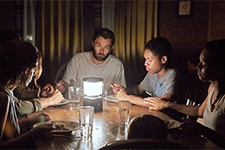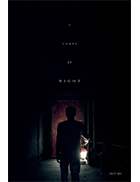It Comes at Night
|  Like his directorial debut Krisha (2015), Trey Edward Shults’s It Comes at Night is a penetrating exercise in escalating dread and despair. Krisha, which was a feature-length expansion of a short film he made in 2014, was a brooding, visually ambitious family psychodrama whose structural tensions and underlying sense of anxiety suggested that Shults might be particularly well suited to the horror genre. It Comes at Night is a horror film and not a horror film, and that gnawing sense of ontological ambiguity is directly connected to its plot, which revolves around various questions that—spoiler alert!—remain purposefully and provocatively unsolved. I have noticed over the past decade or so a tendency for filmmakers in the horror genre to explain too much—to go into backstory and detail that drain their monsters of any sense of myth and mystery, a trend that has, thankfully, been rebuked by a number of excellent, slow-burn horror dramas in recent years, including The Babadook (2014), It Follows (2015), and The Witch (2016). It Comes at Night deserves a place among those films. The story unfolds entirely in and around a secluded, boarded-up house in the woods (no exact location is given, which makes it both everywhere and nowhere). A slow trickle of plot information suggests that the world has been ravaged by some kind of extremely infectious plague, which is always lurking at the margins both physically and narratively. It is never given a name or explained in any way, but it is the monster that drives the terror that eventually turns people against each other, which, in classic zombie-movie fashion as pioneered by George A. Romero’s Night of the Living Dead (1968), is where the real dread lies. The plague, like the living dead in Romero’s films, is just a macguffin, the thing that drives the film’s focus on human behavior under immense stress. The family at the heart of the story has taken refuge in the woods to try to escape whatever it is that has wiped out most of humanity: Paul, the husband and father (Joel Edgerton); Sarah, the wife and mother (Carmen Ejogo), and Travis (Kevin Harrison Jr.), their 17-year-old son. Their lives are driven primarily by routine, most of which involves careful steps to avoid becoming infected, including going outside in pairs and locking the house up at night to ensure that no one can get in (it is thus both a sanctuary and a prison, another of the film’s many merged oppositions). Their self-imposed isolation is broken by the arrival of a second family: A younger father named Will (Christopher Abbott), his wife Kim (Riley Keough), and their three-year-old son Andrew (Griffin Robert Faulkner). Paul is immediately wary of these strangers, but they have something to offer in the form of livestock and chickens, so he allows them to move in—a kind of cautious joining of forces. For all they know, they could be the last people left on Earth, which intensifies their isolation and gives it an aura of mystery. While the joining of the two families at first bears fruit in the form of companionship and comradery, the film’s underlying tension—which is always palpably present—eventually brings them into conflict. Survival is paramount, and when resources are scarce and wariness is the norm, it doesn’t take much to turn people against each other. Shults structures his screenplay and the characters’ behaviors around the intertwined goals of staying alive and protecting one’s family, which in this isolated world is the only form of civilization left. The need to survive, even at the expense of others, is understandable, but also tragic, and Shults wrings a great deal of pathos out of the dilemma faced by Paul, the paterfamilias who must make hard decisions to keep his wife and child alive. Edgerton, who has quickly ascended to the top tier of American actors with powerful performances in recent films like The Gift (2015), which he also wrote and directed, and Jeff Nichols’s Loving (2016), has a distinct everyman quality to him that makes him immediately sympathetic, although he is also able to convey a sense of emotional hardness borne out of being in constant survival mode. Shults and cinematographer Drew Daniels, who also shot Krisha, take a slow, methodical approach to the film’s visual style, relying heavily on repetition of framing and camera movement to both underscore the tedious nature of the characters’ routines and increase their sense of entrapment. They also play with our perception in depicting Travis’s various nightmares without marking them in an immediately perceptible way, so that we do not realize we were in a dreamscape until after he has awakened (and even then it is sometimes difficult to tell what has really happened and what hasn’t). The fact that we get to see into Travis’s mind suggests that he is the film’s true protagonist; being in the stage of late adolescence on the cusp of adulthood, he is more attuned to the moral compromises that must be made to ensure his and his family’s survival. His parents are both fully enmeshed in the role of protector, so single-minded in this task that they can’t see anything else; Travis, like us in the audience, still can, which makes navigating that treacherous moral terrain so difficult. Shults builds a sense of steadily increasing tension that is punctuated with brief moments of respite and a few moments of sudden horror. Those who have seen Krisha will recognize a number of similarities—both films begin with a discomfiting close-up of a human face, they both focus on familial tensions that underscore the importance of connection among family members and the horrors that arise when those connections are betrayed or deformed, and both take place entirely in and around a family’s house—but It Comes at Night is clearly the work of an artist on the rise. Some may have worried that Krisha was a one-off festival hit, but in this follow-up, Shults demonstrates that he has much to offer, although it will be interesting to see if he is able to branch out into other territory or if he will continue to mine this same well of familial anxiety. Copyright © 2017 James Kendrick Thoughts? E-mail James Kendrick All images copyright © A24 |
Overall Rating: 


 (3.5)
(3.5)


